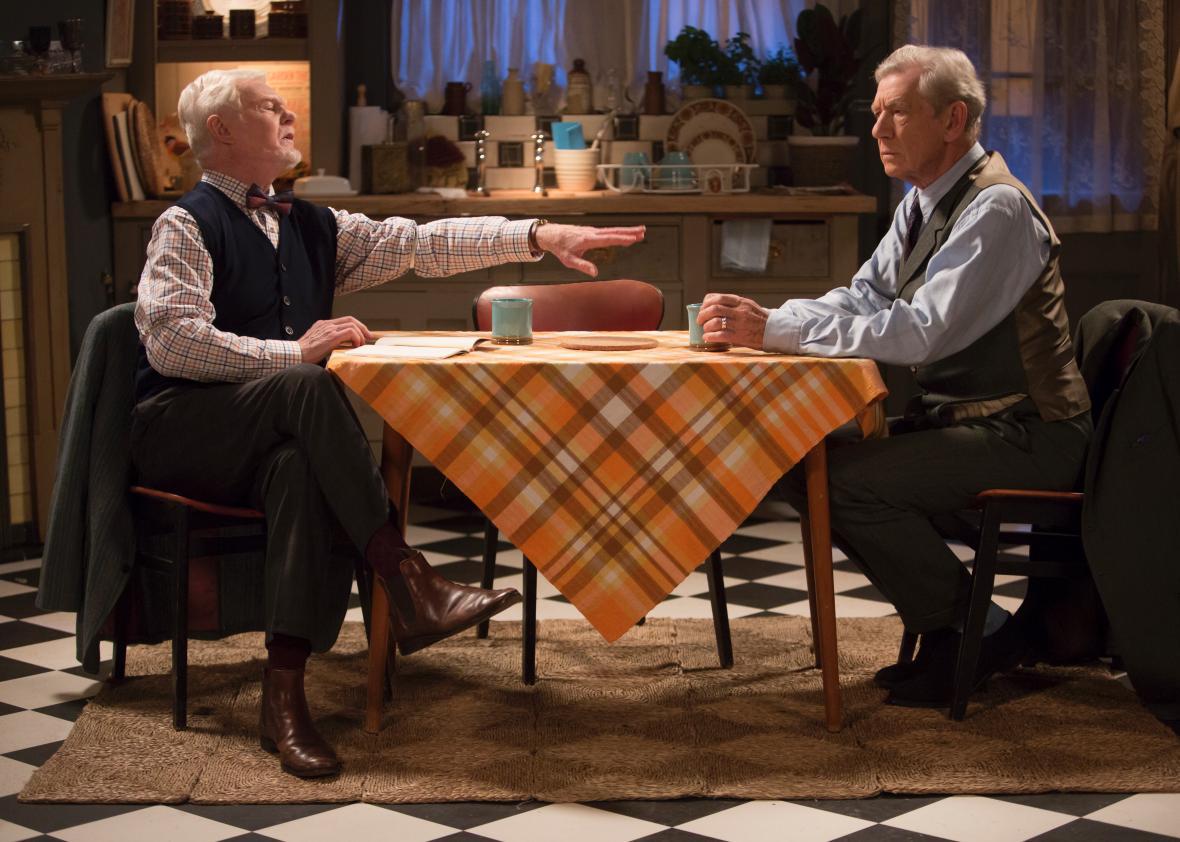Vicious, the British sitcom about a gay couple in their 70s, which aired a special hourlong series finale on PBS Sunday night, was often dismissed as a parade of past-their-sell-by-date stereotypes about bitchy old queens. This was a wrong-headed reading of the show and its ambitions. Vicious—a by queers, for queers, straight viewers might get something out of it exploration of a long-term gay relationship—always had a strong, loving heart beating beneath its mean-queen surface. As my Slate colleague J. Bryan Lowder observed before the Season 1 premiere, partners Freddie (Ian McKellen) and Stuart (Derek Jacobi) laced all their interactions with a drizzle of camp, and that transformed their life together into “a stylized game that is both refreshingly frivolous and deeply serious.”
Over two seasons, the couple’s bitchy barbs generated an appropriate quantity of laughs for a retro Britcom, albeit one written by an American Anglophile. The finale, though, pretty much dispensed with the apparatus of comedy and instead focused on the love and kindness that Freddie and Stuart (and the 13 preceding episodes) had previously kept hidden under layers and layers of arch putdowns and distinctively gay snark.
The opening moments set the tone that follows. Freddie and Stuart, who married at the end of Season 2, descended their apartment’s once-grand staircase with a spring in their steps and an unfamiliar look on their faces—their sex life had apparently perked up since their wedding day. “I wasn’t sure it would still work,” said Stuart as they enjoyed their morning tea, “but it did.” “It’s like riding a bike … that’s been left in the rain for 20 years,” Freddie replied with a sneer. For a certain kind of gay man, especially those who were out when living an openly gay life carried a very real threat of imprisonment and violence, it’s an article of faith that expressions of happiness must be followed by cruel quips. Vicious creator Gary Janetti managed to capture that gay sensibility in less than two minutes of screen time.
Of course, it wasn’t just marriage that changed them—Stuart’s mother died at their wedding, and in the first section of the finale, the newlyweds found themselves the recipients of an inheritance, which they slyly attempted to hide from their friends. That secrecy seems almost to be habit—at first, they’re mean to their old friend Violet (a wondrous Frances de la Tour) and curt with upstairs neighbor Ash (Iwan Rheon, so different from his incarnation as Game of Thrones’ Ramsay Bolton that it’s tempting to imagine Ash being played by an identical twin), but after they’ve met their quota of harsh words, Freddie and Stuart reveal that each of them has quietly deposited half of their windfall into the bank accounts of Violet and Ash, both of whom are having serious money problems. Now Freddie and Stuart are broke again, but it doesn’t matter; the joy in their lives comes from spending time together and with friends, not from conspicuous consumerism or purchasing extravagant gifts for their ancient dog, Balthazar.
The rest of the episode is a series of veil-liftings—ditsy pal Penelope (Marcia Warren) admits that she is terrified to be losing her memory and her sense of self; Freddie’s stern brother Mason (Philip Voss) recalls that their mother was “a monster”; Freddie and Stuart drop their façade of cold-heartedness and shed a tear when Ash heads off to America. In the final scene, as Stuart puts his arm around his husband as they lie in bed together on Christmas night, surrounded by the friends who have become their family, Freddie whispers the final words of the series: “So happy!” That was always Vicious’ predominant emotion, even if some viewers were unable to detect it.
